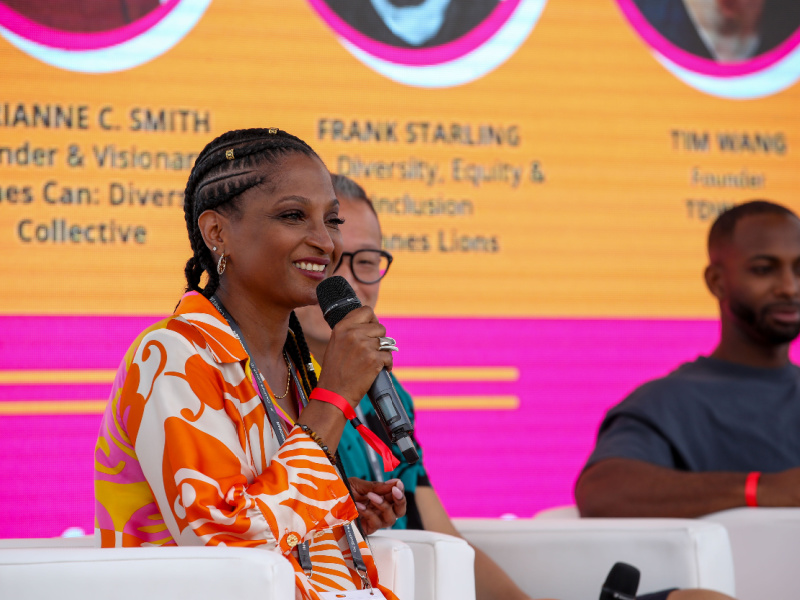Diana Marszalek 20 Jun 2023 // 12:26PM GMT

CANNES — In a conversation at Cannes on Juneteenth, FleishmanHillard chief diversity and inclusion officer Adrianne Smith discusses the Cannes Can: Diversity Collective she created to support and elevate under-represented communities at the Cannes Lions International Festival of Creativity. An edited transcript of her discussion with PRovoke Media's Arun Sudhaman:
How satisfied are you with the progress of CC:DC (Cannes Can: Diversity Collective) here in Cannes, given your objectives.
I always tell the story of the first time I came to Cannes Lions. It was in 2017 and I literally came as a voyeur. And in that voyeurism what I witnessed was the sea of amazing creatives and the palpable energy that was on the streets. I felt it, it was clear. But when you open your eyes to the lens of let’s see what I’m feeling, no one really looked like me. Out of 12-15,000 people, there were only 200 that looked like me. And the interesting thing is that was the year they were talking about how the Cannes Lions can be more inclusive … and I thought, this has to be a trick question. You have to make sure that you create opportunities and access to bring people of color in. You have to be inclusive. You have to tell the story. You have to allow people of color and underrepresented communities in, in different ways other than the talent and superstars, but more as thought leaders who come in and are truly transforming the industry. A lot of the creatives who are here are coopting the culture from those people who are not here. But they are actually winning awards off the coopted communities and creative.
I was able to bring creatives (to Cannes) due to the support of organizations like Google, like FCB, like TV One and BBDO. They were literally the first ones to support the foundation of what you see today. And it was really providing access and opportunity to people. I allowed them to move away from saying I would have, could have, should have, if I had a … to saying I had a chance and this is what I’ve been able to do to pay it forward in terms of inviting other people back and allowing that energy to be infectious so we can see the power of the culture when its inclusive, what it actually does for people. So, what I see is that CC:DC has trailblazed for other groups and organizations to come and feel free. We’ve almost given license to say we are here and so can you.
We moved from five people in 2018 to 25 people in 2019. That was the first year we hosted the first diversity, equity and inclusion activation in the history of Cannes Lions, Inkwell Beach. We named it Inkwell (in reference to a beach on) Martha’s Vineyard, a storied place where white people from Boston and other places in New England would bring their families and their help to vacation, and the only place Black people were allowed to swim was in the worst beach on the island, very rocky. It was called Town Beach. But the white people, in their great way, called it Inkwell because that’s where all the dark people were. But, in their true fashion, most people of color were able to spin it and bring joy and energy. Now people think of Inkwell as a place of great thought leadership, where people go as a respite, people from all over the world. The Obamas go to Inkwell. It's a powerful name and we have brought that energy and spirit to Cannes because it provides a space of hominess. I thought I was building a place for me, and people who look like me. Yet there were more people who said to me, "Adrianne, thank you so much for creating this space because I finally feel like I belong at Cannes Lions."
Have you faced any resistance at all?
Is that a trick question? No. Steve Latham (Cannes Lions festival head of learning) was open-armed to every conversation. There was a woman named Anna, who is no longer with the organization. She literally wrote a manifesto about why it was so important to fill Inkwell and have this community here. A lot of people say yes, but until you’re here and they see … what the strength is and how it builds and grows, that’s when they see the power in it. Everything you see here is because of volunteers, who have come and worked hours with volunteer money. People (and organizations) that we have built relations with over decades who believe in this mission — companies like Proctor & Gamble and IPG and Leo Burnett, they started doing this pre-George Floyd. It wasn’t performative for them. It is what has to be done. This is the right thing to do.
You have the narrow challenge in terms of making sure there are more people of color in Cannes, but the broader challenge is the co-opting of Black culture in so many of the campaigns that win. How do you see progress on that front in terms of giving credit where its due and actually seeing Black people receive the rewards for that work?
There has been a lot of conversation about how we talk about diversity, equity and inclusion as it relates to the awards, highlighting the campaigns that actually support that. Until CC:DC arrived on the scene we had to claim our own space. You can’t have to ask permission anymore. You just have to create it. So, we have created the first inclusion award and unlike what people initially think it’s going to be about — which is black and white, gender equality — it’s not. It’s about all levels of inclusion and making sure diverse and increasing voices are represented.
We had over 25 agencies that submitted for the award. Ideally, it’s going to be something that everyone is going to be vying for moving forward. One of the things jurors noted is that DEI is complicated. The human connection business is not easy to determine. But once you get into it and you can pinpoint exactly what that means and how people are connecting to others of themselves, that’s the true story.
Is it at all a cause for concern that the award is taking place here not onstage in the Palais, which is still heavily white?
It all depends on where you place value. I don’t necessarily need validation from the white community. And I think that’s why it’s so important to have Inkwell here. We are not asking for permission. We’re not asking for validation. We validate ourselves. We don’t need to be on the main stage. We don’t need to be part of the grand community. We are the grand community. Everyone else needs to catch up and come over to Inkwell. It’s less about trying to feel like inserting ourselves into a space that has traditionally pushed us out to creating a space where they are more than welcome to come in.
It's been three years since George Floyd and when that happened and the Black Lives Matter movement elevated, we heard a lot of talk a lot of commitments a lot of promises from many public relations agencies. Now, three years later, I am curious to know whether you feel satisfied with the progress that has been made in that time.
I’ve been through the ebbs and flows of these crisis moments, so it doesn’t jar me that three years later the interest, the spark has gone down. When George Floyd hit and the money was flowing, the message I was telling people was grab what you can, get what you can, make the biggest impact you can that’s going to be sustainable. Because I guarantee you in two or three years all the people who have been hired into all those DEI positions that have been created will be gone. If we look at the numbers, we look at the organizations, most of those people are gone. It's happening on all sides. (In terms of agencies), it’s on an agency-by-agency basis. It’s people looking at the billable hour of this human connection work that they don’t want to put a monetary value on. If it’s not making the dollars and cents piece than sometimes those positions get cut first. It’s just the nature of DEI business. When you look at organizations’ policies, they’re perfect. They have legal built into them, HR strategies. But what has to happen is building the culture and teaching the people to be better humans, that’s the key.
Three years ago, we heard a lot of commitments, a lot of talk, a lot targets. Now when we ask for numbers most agencies are not forthcoming. You reiterated that it’s about a journey, and not necessarily shouting about the numbers. How important are targets just in terms of giving accountability?
What I am learning is the numbers are that measure of accountability that give people something to strive for, to show how great or how not so great they’re doing. And sometimes you have to shift those targets and goals to make sense for your localized mission. I think it depends on where you are and the culture you are working in. It’s about of how we measure (DEI gains), how do we get other people to see it and understand it, and in that way it’s very important.
What’s next for CC:DC?
I see so much opportunity. This morning we had a panel that included the first diversity leader at Cannes Lions, Frank Starling. His first appearance was on the Inkwell stage. I’d like to say that because of our presence Cannes Lions had to hire a DEI director. We’ve blazed some trails here for many groups and organizations. For me, I don’t want us to ever have another Juneteenth moment. So, for us it’s about being able to bridge gaps and connect people who could help elevate each other to the next level. What I see for CCDC is for us to continue to be forward focused in building this community and growing it. We want to be the global voice of inclusion.


































.jpg)


















